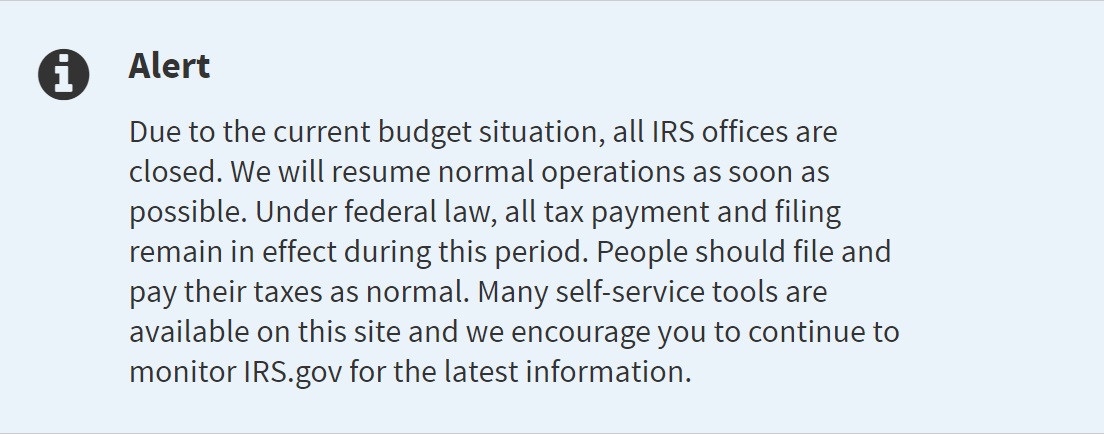One of the many federal agencies that has been affected by the partial government shutdown which began on 22 December 2018 is the Internal Revenue Service (IRS). Although some Americans might rejoice at the thought of the IRS' having to close its doors, the shutdown situation provides no advantages to taxpayers but could create a number of significant difficulties for them.
The IRS isn't completely closed, but reportedly only about 12% of its staff is working through the shutdown (without pay), and that group is primarily focused on security and technology. However, all IRS offices are closed during the shutdown -- which means that even though everyone still has to file and pay their taxes by the regular deadline, they won't be getting any assistance in that regard from the IRS until the shutdown ends:

And as CBS News noted, that potential lack of IRS help is even more disconcerting due to the implementation of significant new tax regulations that took effect in 2018 and the lack of clear direction about if and when electronic tax filings will be accepted in 2019:
That's making tax professionals sweat as they gird for an abridged filing window. The shutdown complicates an already complex tax season due to the myriad new regulations created by the Tax Cuts and Jobs Act, the sweeping bill signed into law by President Donald Trump in late 2017.
"When I look in my tax software, which is professional tax software, there are many forms that haven't been finalized," said Steven Zelin, a CPA based in Manhattan. "We can't file. And since the tax law changed so much, there's a likelihood that there may be a delay" in starting the filing season, he added.
In the last two years, the IRS has announced on Jan. 4 or 5 the date that people can start filing their taxes electronically, usually in the second or third week of January. As of [now], it's unclear when filing season begins.
Perhaps worst of all for taxpayers is that the IRS' contingency plan for "lapsed appropriations" (i.e., a government shutdown) classifies "issuing refunds" as a "non-excepted activity" -- meaning that processing refund payments is not deemed essential and therefore may not be attended to while the shutdown remains in effect.
As of January 7, officials with the Office of Management and Budget (OMB) were maintaining that refunds would indeed by paid during the shutdown:
"Tax refunds will go out," acting director of the Office of Management and Budget Russell Vought told reporters.
The decision marks a reversal of a long-standing policy that refunds due to millions of American taxpayers go unpaid during shutdowns.
A senior administration official said that OMB is relying on a 2011 IRS memo that argued tax refunds can be paid out during a shutdown.
At the time, the OMB's general counsel disagreed with the IRS chief counsel's position and said tax refunds could not be paid out during a shutdown.
In a statement, the IRS said the agency has always held the view that it has the authority to pay out tax refunds despite a lapse of appropriations during a shutdown.
"We are committed to ensuring that taxpayers receive their refunds notwithstanding the government shutdown," IRS Commissioner Chuck Rettig said.
